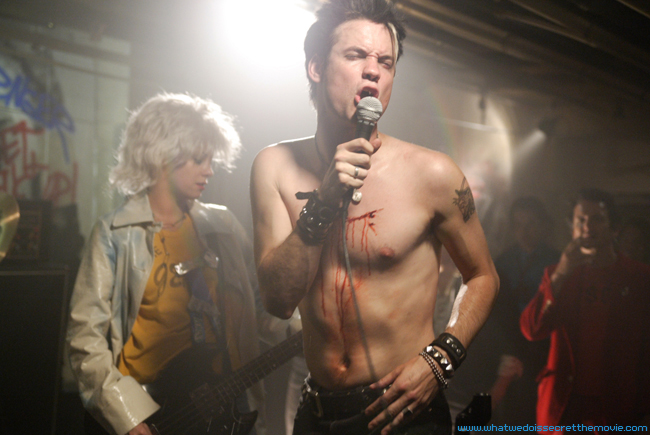|
Reviews of Recent Independent, Foreign, & Documentary Films in Theaters and DVD/Home Video
WHAT WE DO IS SECRET At the start of the 1970s, the Who proclaimed “Teenage Wasteland” in operatic terms. By the end of the decade, the Germs forcibly pushed rock ’n’ roll back toward visceral adolescent rebellion. The Germs were icons of the chaotic Los Angeles punk rock scene of the late ’70s and early ’80s, and What We Do Is Secret (named after one of their songs) delves into how their brief candle burned out so fast. Writer/director Rodger Grossman depicts the nihilist five-year plan of Jan Paul Beahm (Shane West), starting before his reinvention as lead singer Darby Crash. He inspires his friends to join his vision of the band as a punk challenge to corporate rock, dubbing his oldest school buddy Pat Smear (Rick Gonzalez) for a guitarist, a girl on bass, Lorna Doom (Bijou Phillips), and, eventually, fan Don Bolles (Noah Segan) on drums. His charisma and attention-getting, drug-induced stage antics, from self-mutilation to ignoring the microphone, attracted passionately violent fans who proudly wore his badge of circular cigarette burns. With its pseudo-interviews and flashbacks, Grossman’s touchstone is Penelope Spheeris’s 1981 documentary of L.A. punk rock bands and their audiences, The Decline of Western Civilization. (Michele Hicks plays her here.) Just as she included notable performances and interviews with the Germs, a fictional black-and-white interview with Crash is intercut throughout Secret, among interviews with his friends, fans, and band mates filmed in color. The movers and shakers in the music biz are sardonically portrayed via hair styles and slang, such as J.P. Manoux as Rodney Bingenheimer, amusingly deflating the laudatory view of him in George Hickenlooper’s documentary Mayor of the Sunset Strip. While the cast is older than the real-life band, they are familiar from playing teens on TV and in horror flicks, and energetically reenact what was one of the youngest bands in the scene. With the band, West is magnetic (he’s been playing with the surviving members as a “Junior Germs” tribute band). Off-stage, he is strongest where Grossman imagines Crash’s private life, exploring his closeted homosexuality in a relationship with the younger wannabe band mate Rob Henley (Ashton Holmes) within a virulently homophobic environment. (Spheeris misleadingly posed Crash with his friend Michelle Baer Ghaffari, co-writer of the film, during her interview with him, though she filmed explosively nasty homophobic audience behavior at another band’s performance.) Otherwise, the script provides little but pop psychology insight into Crash’s motivations and loyalties. West tries to fill the gaps with brooding intelligence, even as Crash’s drug use and erratic behavior escalates. The Germs may have the most nostalgic interest for Angelenos who remember or missed the scene, but in the many years it took Grossman to fulfill his first dream project since film school, Anton Corbijn’s more elegiac Control has usurped some of the eerily identical territory. Darby Crash was born two years after Joy Division’s Ian Curtis, also filled notebooks with intellectual poems and lyrics (though Crash leaned more towards Nietzschean supermen), and shared a fascination for the glam rock of Iggy Pop and David Bowie and the shock value of Nazi iconography. Both committed suicide in 1980. (Grossman stresses how Crash’s death was overshadowed by the murder of John Lennon the next day). Though
the film gives a new mournful meaning to Bowie’s “Five Years” over the
closing credits, among many evocative song selections,
the Germs’ influence is suggested more strongly through Smear
continuing his life like a punk rock Zelig, going on to play with the
similarly doomed and iconic Nirvana, and rebounding again to play with that
band’s survivors in the Foo Fighters. Nora Lee Mandel
|

